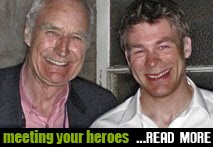 TV PERSONALITY Julia Bradbury takes time out from filming BBC’s Countryfile programme at Chirk Castle to talk to chief reporter David Lawson about what she thinks makes the area so special and why her next project is her greatest challenge yet.
TV PERSONALITY Julia Bradbury takes time out from filming BBC’s Countryfile programme at Chirk Castle to talk to chief reporter David Lawson about what she thinks makes the area so special and why her next project is her greatest challenge yet.“I FEEL like I should apologise to people when I meet them,” confesses Julia Bradbury, the smiling face of BBC’s Countryfile and a whole raft of walking programmes that have caught the public’s imagination.
“I’ve suddenly become one of those people who is on everyone’s TVs all the time,”she laughs, “People are going to start complaining of Julia Bradbury overload!”
With a little friendly persuasion, the small crowd of Friday afternoon visitors gathered around Chirk Castle’s main gate fall quiet as Julia steps out into the sunshine, repeating an interview with a National Trust spokeswoman as her film crew capture it from yet another angle.
The team have been in the area filming a piece for the 40th anniversary of Offa’s Dyke Path, talking to local experts about its ancient woodland and investigating Chirk’s imposing castle. With her piece to camera finished, Julia and I head for a nearby bench for a chat while her crew get set up for their next shot.
“We seem to be on some kind of rota at the moment that says we have to come up to this area at least once every three weeks,”smiles Julia, “It’s great, I absolutely love it here – I just wish it wasn’t such a long drive back.”
The last year alone has seen Julia return repeatedly to the region, from Canal Walks alongside Chirk’s Llangollen Canal to recording nature pieces from Lake Vyrnwy’s RSPB reserve, but having visited virtually every part of the world as a travel presenter and having now walked across a great many of them, I’m curious to know what aspect of Chirk, Oswestry and our borderland region she feels sets it apart:
“It’s the people,”says Julia without hesitation, “The people here always seem to me to be really feisty, and that’s always appealed to me. I’m a feisty girl myself after all.”
She might be feisty, but she’s also incredibly popular,her arrival on Countryfile coinciding with a huge ratings surge, turning the show from a sleepy Sunday morning affair into a surprise primetime hit.
As we continue to chat, school children pouring onto a coach next to us begin to recognise her, smiling and waving from inside their bus, with Julia waving and calling back to them. It’s this same genuine, approachable character that has made her programmes so popular and watchable, yet after presenting so many different types of show from Wish You Were Here through to Wainwright Walks she says she is still unable to pick out her own favourite.
“Oh, it really is impossible to say, everything I do is different and that’s what makes it work for me. I’d be useless in an office,”she admits, “I just couldn’t handle it, but doing this job means each day I can be doing something new.”
Even so, she certainly appears to have found her niche with her immensely successful walking programmes, something that has given her the opportunity to expand into writing books, her latest Canal Walks featuring local sections of the Llangollen Canal: “I absolutely love that!”she enthuses, “I really enjoy the writing process and I’ve got a great co-author who I work with, Claire Jones – another good, proper Welsh girl. We have such fun. It’s definitely something I want to do more of.”

A combination of a tough work ethic and a quirk of scheduling means you can currently spend a whole week
watching nothing but wall-to-wall Bradbury, she jokes, from Country File on BBC 1 and Icelandic Walks on BBCFour, to Canal Walks on BBC 2 and constant repeats of Wainwright Walks on BBC and Sky. Despite this however, a schedule of constant filming for Countryfile alongside her work for various cancer charities, means it doesn’t appear as though she will be disappearing from our screens any time soon.
So what’s next? “Having a baby!”she exclaims, unable to hide her excitement. Currently five months pregnant, 40-year-old Julia admits a medical condition called endometriosis meant she had not been sure she would ever be able to become pregnant. “There’s the Icelandic Walk programme, some other stuff over the summer and lots I want to do in the future,”she says, “but for I’m just really looking forward to being
a mum. I can’t wait!”














